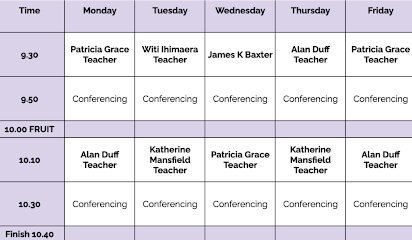I don't do a particularly good job at pre-reading activities. This is something I will be working on. I do it in Guided reading though to pre-empt any issues with understanding the text. I have a wall with morphemes on it, I am going to upgrade this to a full word wall with relevant words both myself and the tamariki have "discovered"!
Saturday, June 22, 2024
Manaiakalani Reading Practice Intensive - Vocabulary and Decoding - Day 6
I don't do a particularly good job at pre-reading activities. This is something I will be working on. I do it in Guided reading though to pre-empt any issues with understanding the text. I have a wall with morphemes on it, I am going to upgrade this to a full word wall with relevant words both myself and the tamariki have "discovered"!
Monday, June 17, 2024
Timetabling Reading
As part of the Reading Practice Intensive course we are working on timetabling of our reading sessions. Previously I disclosed that I had been doing far too many group sessions with every single group every day. Now I have backed off and am trying to work on fewer sessions while still seeing my lower kids every day. It turns out that backing things off is not as easy as it sounded!
From my perspective it has been easier, but from the perspective of the tamariki, it has thrown them through a loop. I had to back off from some of the sessions to enable the change in "feel" in the classroom to settle the tamariki. It was an odd situation. You'd think less time with the teacher would work out better, but no. They found it hard to spend more time doing their mahi or independent tasks. I realised I had created sessions that they needed my help with (or they perceived they did) and having to do more of it without checking in with me was too hard.
We are getting there though. The last thing I need or want is tamariki that depend on me or any adult for approval before they can do the next task.
Regarding the independent tasks; I was already using all but literacy planet as part of the options for independent work. I also use spelling shed with lessons each week they take themselves through. I will be introducing Literacy Planet after I have settled into the teacher groups better and "set them free" with their mahi.
All part of the learning process - particularly with these kids who tend to expect work to be super easy and that if it requires even a moment's thinking, that Whaene Vicki will do it for them or write it for them!
I do reading the same time every morning - it works well and I don't have any ins and outs that affect that time slot. I am looking to rejig this in term two to have some days at different times to see how that works out and to change the daily timetable a bit. I am loathe to do this in the final weeks of term as it will unsettle the routine we have got into.



